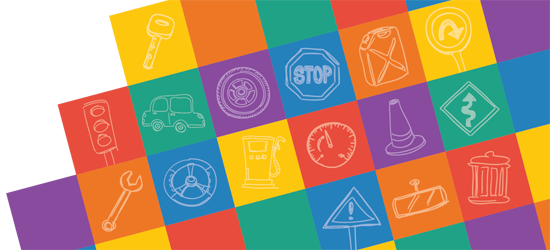
How to practise driving in your own car
If you have the chance to practise driving in the car you'll be driving after your test, you'll be well prepared when it's time to go it alone. Massive bonus.
However, there are a few things you need to be careful with if you're getting private driving practice, to make sure you're not actually undoing the work your driving instructor is doing with you.
Make sure the car is suitable
To be suitable for private practice while you're learning to drive, the car must:
- Be insured for use by a learner
- Display L-plates at the front and back
- Have up-to-date MOT and tax
Before you start practising in the car, take some time to check it over. Vehicle safety will come up in your driving test so it's worth doing a check before every practice run.
Things to check:
- Tyre tread
- Oil, coolant and windscreen wash levels
- Fuel type
- Windscreen wipers
- Seat and seatbelts
- Mirrors
- Lights and indicators
Practise with someone you trust
It's so important to choose someone whose driving you trust and who doesn't have a series of driving offences to their name.
You might be a bit reluctant to drive with your mum or dad but they're a great option because they have years of experience and will be strict with you. A mate is much less likely to pull you up on weak areas.
To do private practice with you, your partner must:
- Be 21 or over
- Have held a full licence for at least 3 years
- Not be asking for any kind of payment
- Not be over the drink drive limit or use a phone
Don't try to learn new things
Your driving instructor is qualified to teach you how to drive. Your private practice partner is not. Even someone who has been driving well for years doesn't know the ins and outs of the latest requirements in road safety and testing!
Once you have completed the syllabus with your instructor you can practise everything that might come up in your test but until then, stick to going over what you've learned so far.
Ask your driving instructor for tips
Your instructor will probably encourage you to do private driving practice if you can, but get some advice before you start. He or she will be able to tell you good places to practise particular things you've learned and might give your practice partner some worksheets for things like roundabouts.
A lot of driving instructors will also happily meet your practice partner and even take them along on a lesson so they can see what’s involved.
By getting your instructor's advice, you and your practice partner can be confident you're doing the right thing.
Put in your own work
As well as actual practice in the car, there are loads of online resources to help you brush up on theory and general road awareness. This kind of practice will help you majorly when it comes to your test.
Try out Drive iQ for practice with:
- Driving awareness
- Coping with distractions
- Improving observation
- Avoiding road incidents
Do things by the book
The key to private practice is to stick to what you've been taught.
Your practice partner may have different ideas on how to do things but you need to make sure you're following your driving instructor's methods, as they know what it takes to pass your test and be a safe driver.
If in doubt, have your instructor talk to your practice partner or ask for recommendations of any resources that will help them brush up on the latest regulations.
Good luck!












